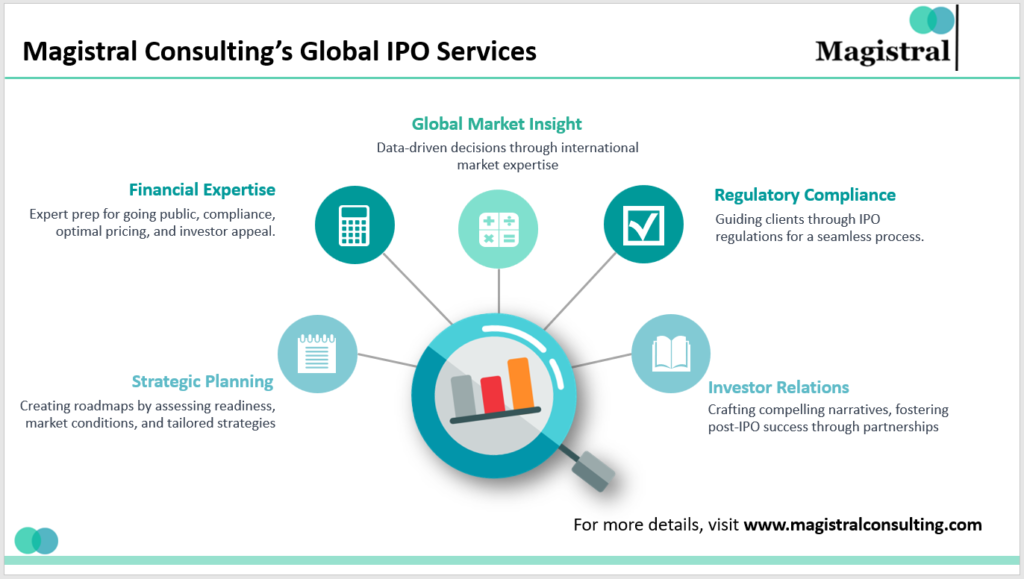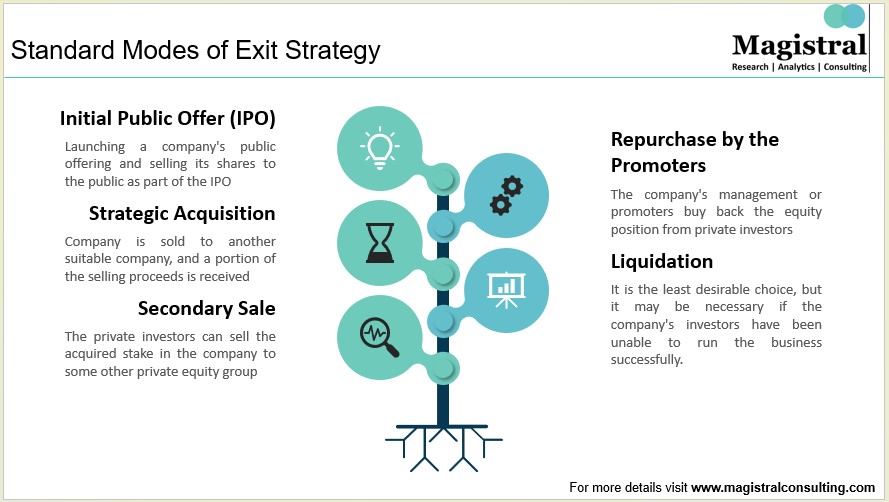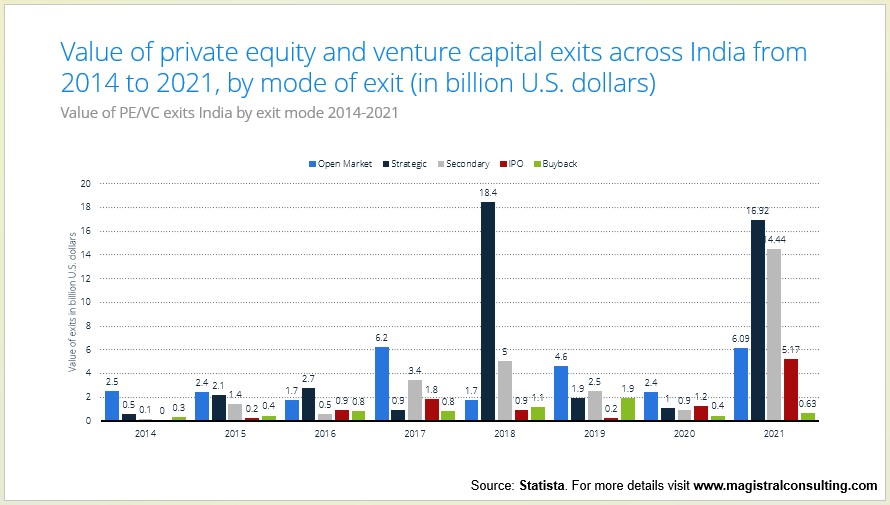Introduction
In the ever-changing world of global financial markets, one term stands out as crucial and has gained significant attention recently: the “Initial Public Offering” or IPO. An IPO marks a major shift for a company, changing it from privately owned to publicly traded. In this discussion, we will delve into the world of Global IPOs, exploring their importance, the trends that influence them, and the role of Magistral Consulting in guiding companies through this complex process.
Understanding Global IPOs
Global Initial Public Offerings (IPOs) encompass a multifaceted process through which companies actively seek to secure funding from the expansive arena of public markets, subsequently positioning themselves for trading on a global stage across a diverse array of international stock exchanges. This strategic decision ushers in a pivotal juncture where companies, with the allure of becoming publicly traded entities, engage in a sophisticated dance of financial dynamics. By embarking upon this transformative journey, businesses open themselves up to an intricate web of opportunities, drawing the attention and investment interest of a wide-ranging spectrum of investors. This, in turn, serves to broaden the canvas of ownership, infusing the enterprise with a newfound sense of dynamism and engagement from a globally dispersed shareholder base.
Investors who enthusiastically participate in this orchestrated financial ballet, by acquiring shares through an IPO, not only align themselves with the company’s trajectory of growth and expansion but also position themselves to reap potential rewards in the form of dividends and capital appreciation. The act of going public extends beyond a mere financial maneuver; it is akin to the unfolding of a strategic narrative. It involves a deliberate orchestration of steps, much like a carefully choreographed performance, where the curtains rise not only on the company’s presence within the marketplace but also on its credibility, visibility, and valuation.
This strategic pivot radiates its influence beyond the immediate financial realm, sending ripples that reverberate across the entirety of the company’s operational landscape. By transitioning into the public sphere, the company not only taps into the wellspring of capital infusion but also gains an amplified voice within the commercial arena. This elevated platform paves the way for increased brand recognition, robust networking, and an enriched ability to execute strategic initiatives that might have been constrained in a private domain. In essence, an IPO acts as a fulcrum upon which the company’s potential and aspirations are poised to be dynamically leveraged, setting the stage for an evolutionary journey that extends far beyond the moment of listing.
The Importance of Global IPOs in Today’s Economy
In the ever-changing landscape of the global economy, the Initial Public Offering (IPO) emerges as a dynamic gauge of market sentiment and a window into the overall economic vitality. This strategic move undertaken by a company to transition into the public sphere signifies not only a profound vote of confidence in the market’s receptiveness to its products or services but also an assertive commitment to propel itself toward growth, foster innovation, and enhance its competitive stance on the global stage. Importantly, the impact of Global IPOs extends beyond the financial realm, as they serve as catalysts for job creation, playing a pivotal role in the economic advancement of regions and nations. Moreover, the significance of IPOs reverberates through the corridors of technological progress, as the capital injection they provide empowers companies to embark on audacious technological journeys, culminating in pioneering breakthroughs that ripple across various sectors, contributing to the advancement of industries and the broader economic landscape.
Trends in Global IPOs
In the intricate realm of global Initial Public Offerings (IPOs), various factors come together to shape their course. These factors span economic shifts, regulatory transformations, and the ever-evolving preferences of investors. Recent trends within the IPO landscape bring to the forefront several noteworthy facets:

Trends in Global IPOs
Influence of Technology
A conspicuous trend within the world of IPOs is the prominence of technology-focused companies. This category encompasses both burgeoning startups and established industry giants. The current IPO landscape bears witness to a surge in these technology-driven enterprises. Innovations spanning artificial intelligence (AI), biotechnology breakthroughs, and the pursuit of sustainable energy solutions have galvanized this trend. Such pioneering advancements serve as magnets, attracting investors with a keen interest in being part of transformative progress.
Embracing Global Horizons
In recent times, a notable shift has emerged as companies increasingly opt for cross-border listings. This strategic move enables them to transcend geographical boundaries, tapping into a wider array of potential investors. This approach not only diversifies their investor base but also bolsters liquidity, thereby contributing to a more dynamic IPO experience. This trend resonates with the profound interconnectedness of global markets, recognizing that successful IPOs transcend local confines.
Ethical Considerations Take Center Stage
Environmental, Social, and Governance (ESG) factors have assumed a central role in the narrative of IPOs. Companies that display robust ESG credentials stand out in today’s IPO landscape. Their commitment to ethical and responsible business practices resonates strongly with socially conscious investors. This alignment with sustainable values goes beyond the immediate IPO phase, fostering a trajectory of lasting and meaningful value creation.
Novel Pathways Unfold
The horizon of IPO options has expanded with the emergence of alternative avenues. Special Purpose Acquisition Companies (SPACs) and direct listings offer innovative paths to going public. SPACs, in particular, have garnered attention for their capacity to merge IPO aspirations with merger and acquisition strategies. Direct listings, on the other hand, promote transparency and autonomy, enabling companies to communicate directly with discerning investors without intermediaries.
In this multifaceted landscape, these trends underscore the dynamic nature of global IPOs. As companies navigate these shifts, they do so within a framework that reflects technological advancements, embraces global interconnectivity, upholds ethical considerations, and explores innovative IPO pathways. These trends collectively contribute to shaping a future where IPOs not only signify financial milestones but also serve as vehicles for broader economic and societal progress.
Magistral Consulting: Guiding the IPO Journey
In the intricate world of Global IPOs, Magistral Consulting stands out as a trusted guide for companies entering the public arena. With a team of experienced professionals, Magistral offers comprehensive services tailored to expedite and optimize the IPO process:

Magistral Consulting’s Global IPO Services
Strategic Planning
At Magistral Consulting, we work closely with our clients to develop a carefully tailored IPO strategy that takes into account the company’s level of readiness and the ever-changing dynamics of the market. Our collaborative approach ensures that every step is well thought-out, aligning with your goals and maximizing your chances of a successful IPO debut.
Financial Expertise
Our team of financial experts at Magistral Consulting is dedicated to ensuring that your IPO journey is smooth and compliant with all necessary regulations. With a deep understanding of the financial landscape, we meticulously guide you through strategic pricing decisions that resonate with investor expectations, laying a solid foundation for your company’s future growth.
Global Insights
In an interconnected world, Magistral Consulting offers invaluable insights into international markets, providing you with the knowledge needed to make informed choices regarding where to list your company. Our global perspective equips you with the tools to assess various listing locations and make decisions that align with your expansion goals.
Regulatory Support
Navigating the intricate web of regulations can be overwhelming, but with Magistral Consulting by your side, you can navigate the regulatory landscape with confidence. Our seasoned experts bring a wealth of experience to guide you through the complexities, ensuring that your IPO process remains compliant and efficient, reducing any potential roadblocks.
Investor Relations
Cultivating strong relationships with investors is essential for post-IPO success, and Magistral Consulting excels at crafting compelling narratives that resonate with your investors’ interests. By fostering meaningful connections through effective communication strategies, we set the stage for enduring partnerships that contribute to the long-term growth and prosperity of your company in the public domain.
About Magistral Consulting
Magistral Consulting has helped multiple funds and companies in outsourcing operations activities. It has service offerings for Private Equity, Venture Capital, Family Offices, Investment Banks, Asset Managers, Hedge Funds, Financial Consultants, Real Estate, REITs, RE funds, Corporates, and Portfolio companies. Its functional expertise is around Deal origination, Deal Execution, Due Diligence, Financial Modeling, Portfolio Management and Equity Research
For setting up an appointment with a Magistral representative visit www.magistralconsulting.com/contact
About the Author
The Author, Prabhash Choudhary is the CEO of Magistral Consulting and can be reached at Prabhash.choudhary@magistralconsutling.com for any queries or business inquiries.



